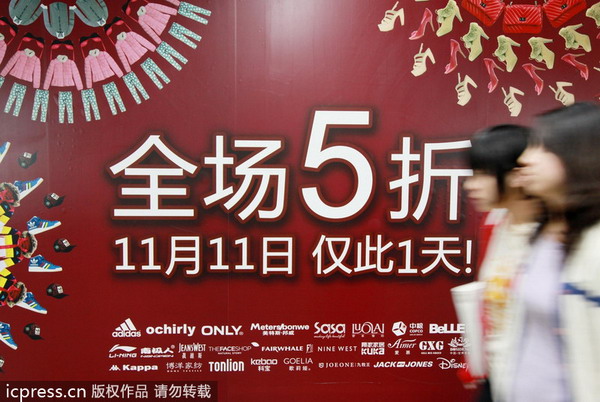Singles Day ignites online retail frenzy
Updated: 2013-11-09 11:23
(Xinhua)
|
||||||||
|
 An advertisement for retail promotion on Singles' Day is seen in Nanjing, Jiangsu province, Nov 7, 2013. In the run-up to the annual online shopping spree on Nov 11, major e-commerce players have dealt a fresh blow to traditional retailers by allowing consumers to try out their products before placing orders online. [Photo / icpress.cn] |
BEIJING -- Five years after China launched its own Cyber Monday - in the US, the Monday after Thanksgiving, promoted as an online shopping day - the lines have blurred between online retail platforms and bricks-and-mortar stores.
The erosion of the role of malls and local stores has incurred the wrath of dyed-in-the-wool retailers, and in the run-up to the annual online shopping spree on Nov 11, major e-commerce players have dealt a fresh blow to traditional retailers by allowing consumers to try out their products before placing orders online.
While online retailers extend the shopping experience beyond the cyberspace and back into physical stores, yet more transactions will be made over the Internet, as better deals draw customers away from malls and department stores.
"E-commerce means stiffer competition in the retail sector, and retailers know the rush to the web is unstoppable," said Lu Renbo, deputy secretary general of China's Electronic Chamber of Commerce
E-competition is shifting from a simplistic price war to optimizing the shopping experience, according to Liu Qiangdong, founder and CEO of Jingdong, the nation's second largest online retailer.
Despite the e-commerce forays into their territory, traditional stores are ambivalent in the face of teetering sales.
Reaction to the switch to online from offline, known as the O2O business model, are mixed among retailers, who either open 'branches' in online marketplaces or simply brood over declining sales.
"E-commerce is upending traditional thinking, management and business models," said Sun Weimin, deputy chairman of Sunning, originally a home appliance chainstore, recently morphed into an O2O retailer.
Sunning expanded its product range and unified prices on and off the net. The company announced on Wednesday plans to close some of its 1,600 stores and revamp the remainder to support the online shopping experience and coordinate with logistics.
"At the end of the day, there is no distinction between online and offline: All stores will become a part of online retailing," said Wang Jian, chief techie at Alibaba, whose business-to-consumer marketplace TMall.com and consumer-to-consumer website Taobao.com claims the lion's share of China's online retail sales.
But not everyone is up for the change. As Singles Day approaches, a total of 19 home furnishing retailers have rallied against TMall, which has talked more than 30,000 traditional retailers into opening shops on its online bazaar while displaying their wares in their "offline" stores.
"When it comes to innovation in retail, it's a lot easier to just pay lip service, but who's ready to do so at the expense of their own interest?" said Shao Xiaofeng, chief risk officer at Alibaba.

 Brand China in leading role on Transformers set
Brand China in leading role on Transformers set
 Super typhoon Haiyan slams into Philippines
Super typhoon Haiyan slams into Philippines
 Market moves to modern mall as Lhasa safeguards the past
Market moves to modern mall as Lhasa safeguards the past
 In small-town China, movies are big
In small-town China, movies are big
 A gathering of gourmets
A gathering of gourmets
 50 arrested at LA protest over Wal-Mart wages
50 arrested at LA protest over Wal-Mart wages
 Kerry to join Iran nuclear talks in bid to reach deal
Kerry to join Iran nuclear talks in bid to reach deal
 Politicians court US-Asians amid anti-China sentiment
Politicians court US-Asians amid anti-China sentiment
Most Viewed
Editor's Picks

|

|

|

|

|

|
Today's Top News
China's discipline agency targets holiday luxuries
Chinese land reform at crucial stage
Senior official at Cosco under investigation
Li appoints advisers to key govt think tank
Taxi driver is lone suspect in Taiyuan bomb blasts
Iran talks aim to close ' important gap': Kerry
Close eye to be kept on trans fats
Shanghai leads effort to rein in housing market
US Weekly

|

|






